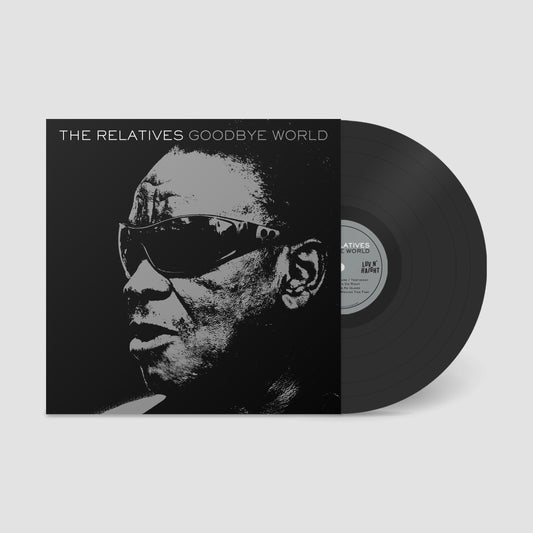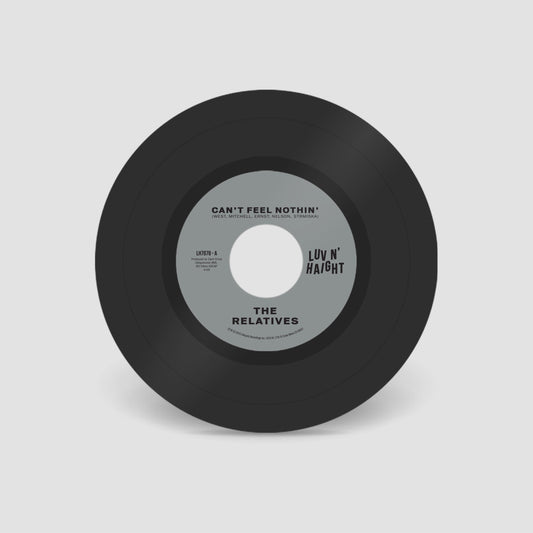"I got a little more work for you to do."
That's what the late Reverend Gean West sings—or rather testifies—on the opening track of Goodbye World, the new and deeply emotional album from the triumphantly unlikely gospel funk band the Relatives. The group started working on the record in the summer of 2014, but Gean was able to lay down his signature gravelly vocals on only two songs before he became ill and fell into a coma. He remained unconscious for twelve days, and it was during that time he heard God's voice telling him to get back to work. "Don't let me down, son," the voice commanded.
Gean took that admonition to heart. He and the band returned to the studio in January 2015, where he incorporated a riveting spoken-word account of his near-death epiphany into the band's reworking of Tim Maia's “Rational Culture.” Over the course of two nights, he managed to cut all his remaining vocals on the album, except for its last song, “Forgive Me Now,” which he proved too weak to perform. He was rushed to the hospital two days after the second session. A week later, after guitarist and producer Zach Ernst had done some overdubs and mixing, fellow band member Earnest Tarkington brought an early version of “Rational Culture / Testimony” to Gean’s bedside. Gean listened to its swirling psychedelic guitars, the impassioned vocals of his brother Tommie singing “He gonna rule the world, don't you know, don't you know.” And he heard his own powerful preacher's voice—with no hint of weakness or illness in it—bearing witness to the epiphany he had experienced in his coma. It was a rough mix but all the elements were there, all the righteous energy and joyful passion that had been the Relatives' trademarks since Gean formed the group in 1970. Gean asked Earnest to play the track twice. He smiled all the way through as he listened to it. Gean—or God, or both—must have thought his work was finally done, because he died the next day.
The Relatives’ long career non-path has become one of the more improbable stories in contemporary popular music. Gean West grew up in a musical family in Dallas that was well known within gospel circles. Because legends such as Sam Cooke, Aretha Franklin, Tina Turner, and the Staple Singers were denied rooms in all-white hotels in the pre-integration south, they often used Gean’s mother’s house as a layover stop. As a young boy, Gean preached door-to-door for nickels and quarters. When he became a guest of the Texas Prison System in the mid-1950s, serving a five-year sentence for car theft, he combined the preaching with singing, so effectively that the warden at the Clemens unit in Brazoria nicknamed him “Songbird.” After his release, following the warden’s advice to “get on out of here and do yourself good,” he returned to Dallas determined to follow a righteous path. He began touring with the Sensational Golden Knights in 1958, and, as leader of the Shreveport Southernaires, even cut a 45 with Houston hitmaker Don Robey.
Gean built a respectable career as a master of traditional gospel in the early and mid-60s, and his reputation as a fiery frontman began to bloom. But by the late 1960s, when the sounds of James Brown, Sly Stone, and Jimi Hendrix were disrupting the airwaves, Gean felt an urgent need to deliver the Word to younger audiences. He enlisted the help of younger brother Tommie West (a talented frontman in his own right), drummer Earnest Tarkington, and guitarist Charles Ray “Gypsy” Mitchell to craft a whole new sound: gospel funk. Unfortunately, Gean's innovation had too much gospel for the kids and too much wah-wah guitar and fuzzy organ for the older folks, and the Relatives never took off. The band released two regional singles with little fanfare before Tommie and Gypsy departed. Gean, Earnest, and an otherwise all-new lineup recorded a half-dozen tunes with Denton producer Phil York in 1974, and they continued to perform sporadically. But they finally hung it up in 1980.
Over the next three decades, though, the band that never found an audience began to slowly amass an underground following. The Relatives’ complete 1970s output was released on the 2009 Heavy Light Records compilation Don't Let Me Fall. Label owners Noel Waggener and Charisse Kelly had tracked down Gean after hearing a cracked, dusty copy of one of those early singles, which had been bought at a garage sale by the mother of Austin record shop owner Mike Buck. Noel and Charisse persuaded Gean to reunite the Relatives to support Don’t Let Me Fall, and suddenly the band that tossed in the towel thirty years earlier was hitting stages at the Lincoln Center and in Australia. When their guitarist and drummer couldn't make it to a gig in France, Black Joe Lewis & the Honeybears members Zach Ernst and Matthew Strmiska volunteered to sub in and never left. Producer Jim Eno lured the group back into the studio in 2012, after being blown away by their harmonies and showmanship at an Austin club gig. The Relatives finally released their first full-length record, The Electric Word, in 2013.
And now there is Goodbye World, named for a song that Gean first cut over fifty years ago with the Southernaires and performed live with the Relatives in the 70s and at their first reunion show. The success of the Relatives has had far more to do with random occurrences and felicitous discoveries than with a deliberate career trajectory. But there's something about Goodbye World that makes you think that this album had the hand of destiny resting upon it. Not only did Gean feel the call to get back to life and work from his comatose state, but the album also marks the return of Gypsy, the group's original guitarist. Gypsy had left the group in ’72 or ’73, and didn't rejoin them until a hometown street fair gig in late 2013. His Eddie Hazel-meets-Ernie Isley guitar heroics and bass-to-falsetto vocal range are a key contributor to the album's sound (that’s Gypsy singing both lead and back-up on “No Man Is An Island”), and he arranged the vocals and rhythm section on half of the record’s tracks.
And of course Tommie and Earnest are here too, and Gean’s son Cedric, plus a few of the finest contemporary gospel singers West Dallas has to offer. The record they have made is more serious, more somber, more reflective than The Electric Word. Though it has its share of breakbeats and up-to-the-minute exhortations about race and violence, its dominant tone is serene and unhurried, the work of a group that has been around a long time and of a man who has glimpsed what lies beyond the material world.
The Reverend Gean West is unforgettably present on cuts like “Rational Culture / Testimony” and “Can’t Feel Nothin’.” But in a strange way his voice is most resonant on the song where it doesn’t even appear. This is “Forgive Me Now (Songbird Goes Home),” a bluesy traditional track that Gean had wanted to nail on record since 2011. It would give him an opportunity, he said, to really testify. In the rehearsal at Tommie’s church a few nights before the January sessions, he tore into the song with the blazing authority of Muddy Waters. Tommie, Gypsy, and new vocalist Kenneth Stokes laid down the backgrounds at the end of the second session, and Gean told Zach that he’d be back in a few days to record the lead. But before he could do so his shaky health led to the hospital stay from which he never returned. Zach enlisted one of Gean’s friends and collaborators, Denton-bred B3 master Mike Flanigin, to take his place and cover the lead vocal section. Mike does a beautiful job, respectfully supplying his own voice in a way that never tries to cover up the reality that the voice of the inimitable Reverend Gean is absent. But maybe absent isn’t exactly the right word. Because if you listen carefully you can still hear Gean singing—it’s just that he’s singing somewhere else.






